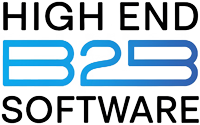In today’s fast-paced digital work culture, managing remote teams has become the new norm — not the exception. best project management tools. Whether you’re running a SaaS startup, scaling an agency, or managing client projects across continents, one thing is certain: you need the right project management tools to keep everyone aligned, productive, and on track.
Gone are the days when simple spreadsheets or endless email threads could manage workloads effectively. Remote teams face unique challenges — from different time zones and communication gaps to task visibility, accountability, and maintaining momentum. That’s where project management software tailored for remote collaboration comes into play.
The best tools today offer real-time dashboards, task tracking, video call integrations, automated reminders, shared documentation, and even built-in time tracking. They bridge the gap between strategy and execution — helping distributed teams stay connected, meet deadlines, and scale operations with clarity and speed.
But here’s the kicker: not all project management tools are built for remote teams. Some are bloated with features you’ll never use. Others lack essential collaboration functions like chat, integrations, or intuitive design. And some tools just don’t scale well when your team or client list grows.
So how do you choose the best tool?
I’ve tested, reviewed, and implemented dozens of PM tools for different B2B teams — from fast-moving SaaS startups to remote marketing agencies and ecommerce teams. The tools I’m about to share are not only remote-friendly, but they’re also scalable, affordable, and packed with integrations to fit into your existing stack.
Whether you’re looking for simple task lists, advanced Gantt charts, or AI-powered automation, this guide covers the top-performing project management tools for remote teams in 2025, based on real-world use cases, user feedback, and deep feature analysis. best project management tools.
You’ll discover:
- Which tools make remote communication seamless
- What features actually boost productivity (and which ones are fluff)
- How each tool performs across UX, pricing, integrations, and support
- Pros and cons for each — so you can decide what’s right for your team
- Who should use which tool (freelancers, startups, agencies, etc.)
Plus, I’ve included verified user reviews, pricing breakdowns, and helpful links to free trials or demos — so you can test before you commit. best project management tools.
Important Note:
This post contains affiliate links. If you grab something through them, I may earn a small commission — at no extra cost to you. I only recommend tools I’ve used, tested, or researched thoroughly.
Ready to streamline your remote team’s productivity?
1. ClickUp – The All-in-One Powerhouse for Remote Teams
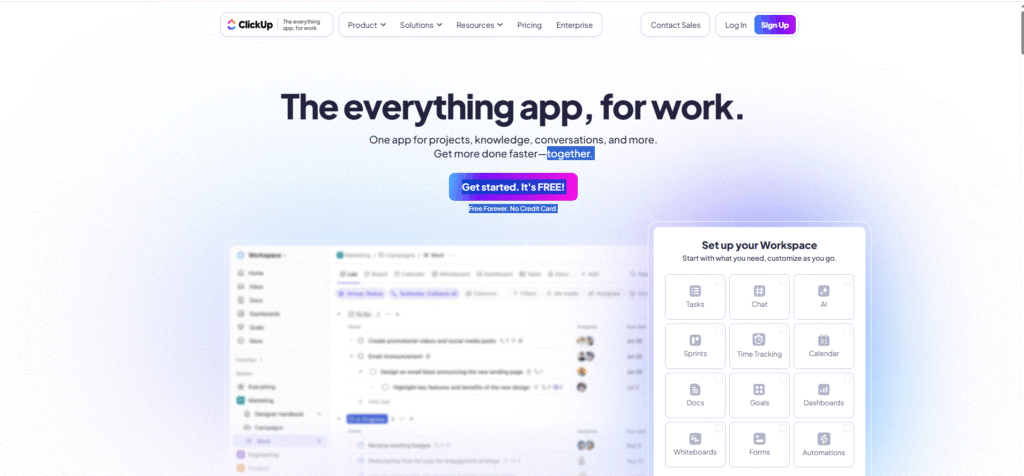
Official Site: Visit ClickUp
If you’re managing a distributed team that juggles multiple projects, deliverables, and clients, ClickUp should be at the top of your list. It’s one of the most versatile project management tools on the market — and it’s specifically built to reduce tool overload. From task management to time tracking, docs to dashboards, ClickUp brings everything under one roof. Remote teams love how it centralizes collaboration without sacrificing speed or scalability.
Key Features & Benefits:
- Assign tasks, subtasks, and dependencies effortlessly
- Multiple views: List, Kanban, Calendar, Gantt, Timeline
- In-app chat, docs, goal tracking, reminders, and screen recording
- Native time tracking with workload balance views
- Custom automations and recurring tasks
- 1,000+ integrations: Slack, Google Drive, Zoom, Teams, GitHub
Pros
- Seamless integration with remote tools (Zoom, Slack, Google Meet)
- Extremely customizable workflows, statuses, and templates
- Intuitive UI for teams of all technical levels
- Free Forever plan with robust features
Cons
- Can feel overwhelming for new users due to the many features
- Automations are limited in the Free plan
Best For: SaaS startups, remote agencies, marketing teams, and founders scaling cross-functional teams across locations.
My Take:
After using ClickUp for multiple client projects and internal agency work, I can confidently say it replaces 3–4 tools in one go. You don’t need separate apps for docs, tasks, time tracking, or reporting — ClickUp does it all. The ability to switch between list, board, and calendar views means every team member can work the way they prefer. It’s a dream tool for remote project leads.
2. Asana – Intuitive, Organized, and Built for Team Flow

Official Site: Visit Asana
Asana has earned its place among the top project management platforms because of its beautiful interface, ease of use, and excellent structure for teams managing recurring tasks, timelines, and milestones. Whether you’re working on content calendars, product development, or internal ops, Asana’s simple-yet-powerful tools help remote teams stay aligned and productive — without meetings overload.
Key Features & Benefits:
- Task assignment with due dates, priorities, subtasks, and dependencies
- Timeline, List, Kanban, and Calendar views
- Milestone tracking and workload management
- Rule-based automations for repetitive actions
- Native integrations with Slack, Google Workspace, Zoom, and Teams
- Easy @mention collaboration, file uploads, and status updates
Pros
- User-friendly, minimal learning curve
- Great visual planning tools for remote teams
- Built-in templates for marketing, product, and sprint planning
- Fast, responsive mobile and desktop apps
Cons
- Limited advanced features in the free plan
- Customization is less flexible than ClickUp or Notion
Best For: Teams who prioritize clarity, timelines, and structured workflows with a smooth learning experience.
My Take:
Asana feels like the project tool every remote team wants to use. It’s fast, clean, and structured in a way that just works. The Timeline view is perfect for marketing or product launches, while Kanban helps agile teams move fast. I especially like how non-tech users quickly get up to speed — it’s project management without the stress.
3. Monday.com – Custom Workflows for Creative Remote Teams
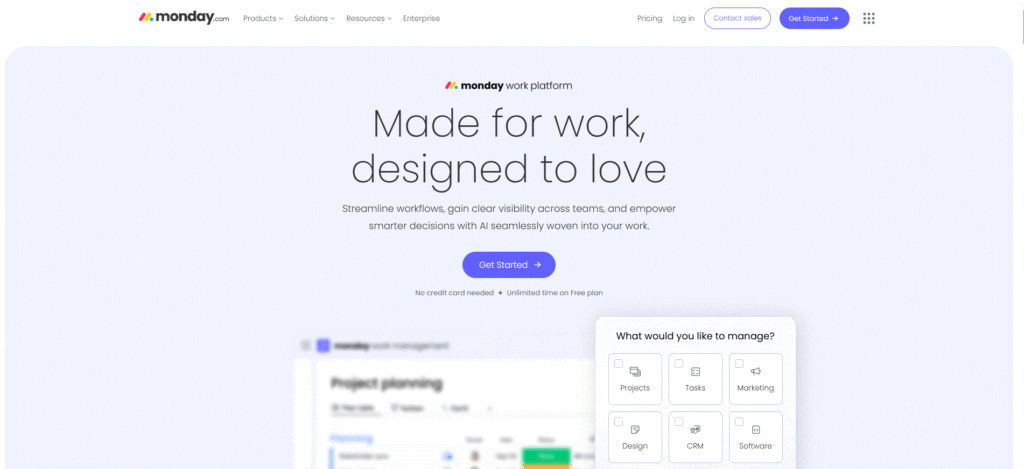
Official Site: Visit Monday.com
Monday.com stands out as a flexible, colorful platform that helps remote teams organize everything from marketing campaigns to software sprints. With its highly customizable boards, automations, and dashboards, it’s ideal for teams that want to build their own unique workflow and visualize progress at a glance.
Key Features & Benefits:
- Drag-and-drop boards with over 20+ column types
- Multiple views: Kanban, Gantt, Calendar, Timeline, Workload
- Advanced automations for recurring tasks and triggers
- Time tracking and file collaboration within tasks
- Dashboards for analytics, project health, and workload
- Integrations with Slack, Zoom, Microsoft Teams, Zapier, Trello & more
Pros
- Super customizable to fit any remote workflow
- Clean, colorful interface great for visual thinkers
- Templates for marketing, HR, dev, and CRM workflows
- Strong support and help documentation
Cons
- Can feel overwhelming for first-time users
- Higher tiers required for full automation access
Best For: Remote teams that need a visually-driven workspace to manage diverse projects and stay aligned.
My Take:
Monday.com is a dream for teams that want flexibility without sacrificing structure. I’ve used it with both creative teams and dev squads — and everyone loves how easy it is to make boards reflect exactly what they need. best project management tools.Automations save tons of time, and the mobile app is just as smooth.
4. Notion – The All-in-One Workspace for Remote Collaboration
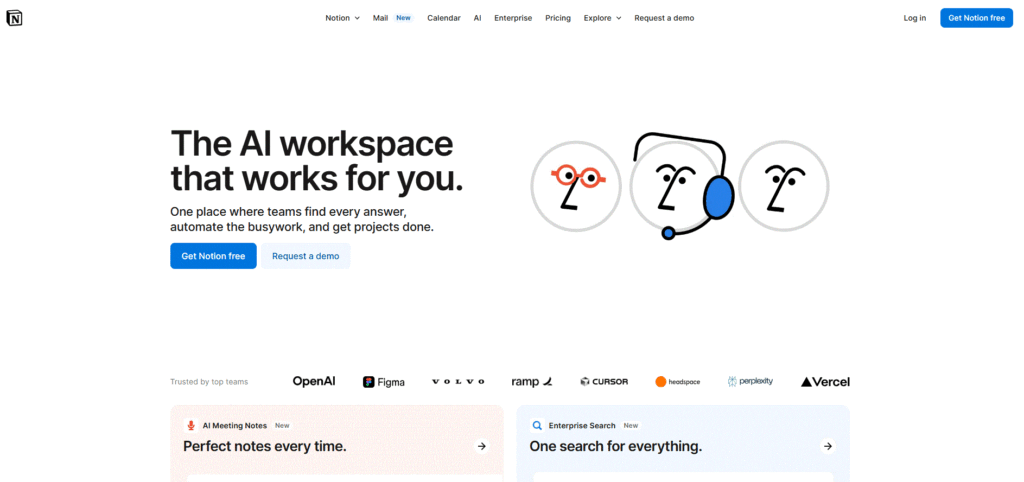
Official Site: Visit Notion
Notion isn’t just a note-taking app — it’s a powerful hybrid tool that combines docs, wikis, tasks, databases, and calendars. For remote teams, it acts as a centralized hub where everyone can collaborate asynchronously, organize projects, and document SOPs—all in one place.
Key Features & Benefits:
- Flexible blocks: turn text into databases, tables, lists, Kanban boards
- Real-time collaboration with comments and mentions
- Page sharing and permission control for clients and contractors
- Templates for project management, content calendars, CRM, and more
- Integration with Slack, GitHub, Google Drive, and Notion API access
- Works beautifully across desktop, mobile, and tablet
Pros
- Clean, minimal UI that’s easy to customize
- Great for creating internal documentation and wikis
- Excellent collaboration features for async work
- Growing community with tons of templates and resources
Cons
- May require onboarding to use advanced features
- Not ideal for time-tracking or complex Gantt charts
Best For: Startups and remote teams who want a central place to document, organize, and plan projects visually and collaboratively.
My Take:
After switching to Notion for internal documentation, I saw immediate gains in clarity and alignment. We built out entire SOPs, onboarding flows, and editorial calendars in a single workspace. best project management tools.It’s perfect if your remote team values transparency, collaboration, and customizable structure over rigid software.
5. Smartsheet – Spreadsheet-Powered Project Management
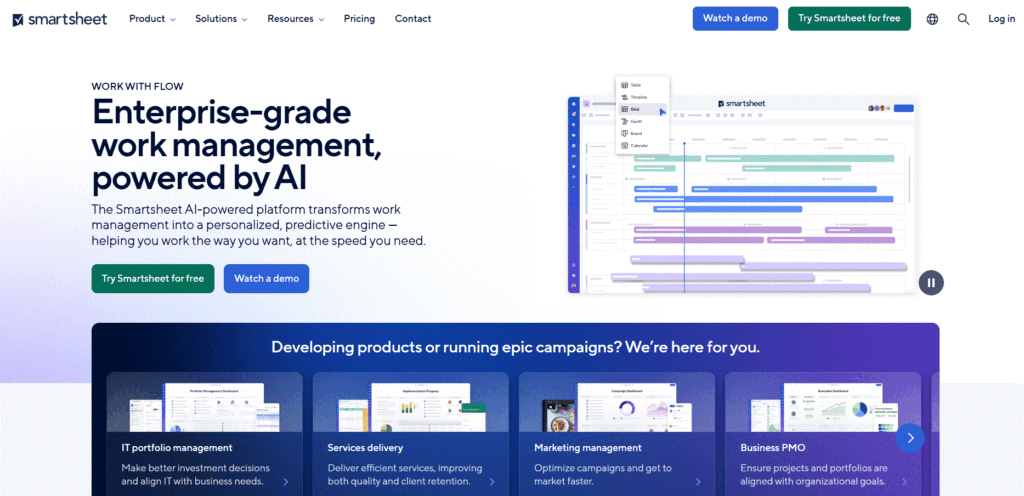
Official Site: Visit Smartsheet
Smartsheet takes the familiar interface of spreadsheets and supercharges it with project management features. It’s especially useful for remote teams that love the grid-style layout but need real-time collaboration, automated workflows, and dashboard reporting. Best project management tools. Whether you’re managing marketing campaigns or IT projects, Smartsheet makes it scalable.
Key Features & Benefits:
- Spreadsheet-style task and project tracking
- Automated alerts, reminders, and status updates
- Gantt charts, calendars, and card views
- Advanced reporting and resource management
- Role-based permissions and workflow automation
- Integrations with Microsoft 365, Slack, Google Workspace, Salesforce
Pros
- Familiar UI for spreadsheet users
- Enterprise-grade collaboration features
- Scalable across departments and use cases
- Excellent automation for recurring tasks and approvals
Cons
- Slight learning curve for non-spreadsheet users
- Can get pricey for small teams
Best For: Remote project managers who need structure, reporting, and spreadsheet-level control over workflows.
My Take:
If your remote team deals with a lot of data, timelines, or approval processes, Smartsheet will feel like a godsend. It’s much more than Excel in the cloud — it’s a robust PM tool for serious collaboration. Best project management tools. We used it for content planning and performance tracking, and it streamlined our workflows significantly.
6. Trello – The Visual Kanban Board for Team Collaboration
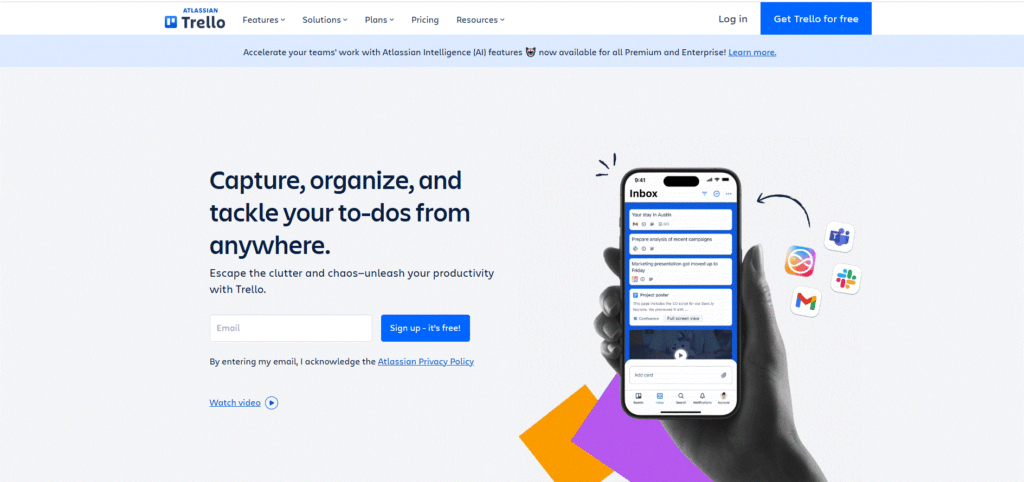
Official Site: Visit Trello
Trello remains one of the most intuitive and accessible project management tools for remote teams. Best project management tools. Using a simple Kanban board system, Trello lets you organize tasks into cards and move them across customizable lists. Whether you’re running agile sprints or planning blog content, Trello is flexible enough to fit any workflow.
Key Features & Benefits:
- Drag-and-drop Kanban boards
- Custom fields, labels, checklists, deadlines
- Workflow automation with Butler (built-in automation tool)
- Real-time updates and team tagging
- Integrates with Google Drive, Slack, Jira, Zoom, and more
- iOS, Android, and desktop apps for seamless access
Pros
- Extremely easy to use and onboard new team members
- Highly visual and customizable
- Great for task delegation and collaboration
- Free plan is generous for small teams
Cons
- Not ideal for complex project tracking
- Limited built-in reporting features
Best For: Small to medium remote teams needing a lightweight, visual way to manage tasks.
My Take:
Trello is my go-to when I need a fast, visual overview of tasks. I’ve used it with design teams, blog editors, and SaaS developers — and it works like a charm every time. best project management tools. It’s great for async collaboration where everyone needs to stay on the same page without long meetings.
Comparison Table: Best Remote Project Management Tools
| Feature | Details | My Take |
|---|---|---|
| Interface & Ease of Use | Clean dashboards, drag-and-drop tasks | ClickUp and Trello lead the pack |
| Integrations | Zapier, Slack, Drive, Zoom, GitHub, etc. | Monday.com and ClickUp win here |
| Pricing | Free to $20/user/month | Paymo and Zoho Projects offer value |
| Customization | Templates, automations, workflows | ClickUp is the most customizable |
| Best For | SaaS, Agencies, Freelancers, Enterprises | Pick based on size and workflow |
FAQ: Best project management tools
What is the best project management tool for remote teams?
It depends on your needs. For all-in-one power, try ClickUp. For simplicity, go with Trello or Basecamp. For time tracking and invoicing, Paymo is great.
Are these tools free?
Yes, most offer free plans or trials. For example, ClickUp, Trello, and Asana have generous free tiers.
Can I switch tools later?
Absolutely. Most platforms allow data export/import. Try a few, then commit to the one that fits your team best.
Which tool works best for client work?
Teamwork and Basecamp are designed with client collaboration in mind.
Do these tools work on mobile?
Yes. All tools listed offer Android and iOS apps for remote team members.
Final Thoughts: Choosing the Right Project Management Tool for Your Remote Team
There’s no one-size-fits-all solution when it comes to project management tools for remote teams. Each platform we’ve covered brings unique strengths depending on your team’s workflow, size, and collaboration needs. Best project management tools.
- If you’re just starting and want simplicity → Trello or Asana is a great choice.
- For advanced features and full customization → ClickUp or Monday.com are top picks.
- Want seamless client communication? → Teamwork or Basecamp may be ideal.
- Need built-in time tracking or invoicing? → Paymo or Zoho Projects shine here.
The best advice? Pick a tool your entire team will actually use. Test a few, explore free trials, and involve your team in the decision-making process. Best project management tools.
Most tools offer free tiers or free trials—so don’t hesitate to try before you commit.
Interested in automation too? Don’t miss our guide on Best No-Code Automation Platforms for Small Business
